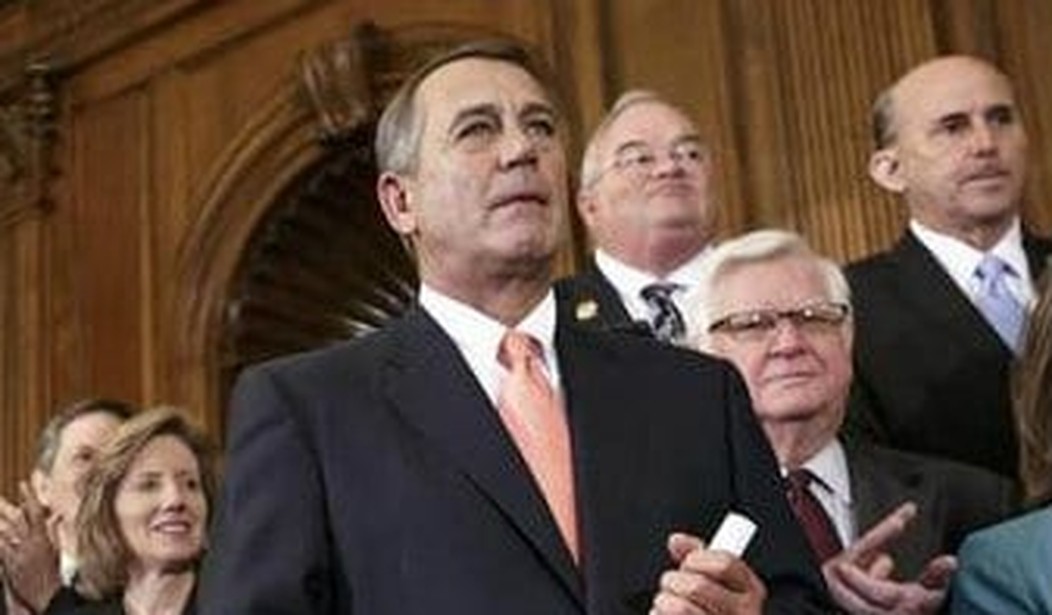WASHINGTON – With official Washington already partially shut down over an Obamacare funding dispute, House Speaker John Boehner is searching for a way to avoid a looming battle over raising the nation’s $16.7 trillion debt ceiling.
Boehner (R-Ohio) is meeting with fellow Republicans in group settings, taking the temperature of members on how best to proceed on the bottled-up spending package, known as the continuing resolution, while also determining what to do about clearing the way so Uncle Sam can borrow the money necessary to pay its bills.
Boehner is telling fellow GOP lawmakers that he will not permit the U.S. to default on its obligations, an anticipated consequence if Congress fails to raise the debt ceiling by around Oct. 17, according to Treasury Secretary Jack Lew.
How that goal might be achieved remains unclear. Boehner and President Obama have failed to reach accord on a spending plan, with House Republicans to this point insisting that the White House and Senate Democrats agree to either defund or postpone by a year the implementation of the Affordable Care Act, the healthcare law that stands as the most significant achievement of the first five years of Obama’s administration.
The standoff has resulted in the partial government shutdown with no resolution in sight. The debt ceiling debate could complicate matters even further.
Lawmakers who have met with Boehner acknowledge that the Speaker has expressed a willingness to waive the unofficial Hastert rule, named after former House Speaker Denny Hastert (R-Ill.), who refused any legislation to the House floor for a vote unless it carried the support of a majority of his caucus. If he follows that route Boehner would have to rely on support from opposition Democrats to get the measure through.
But publicly at least the Boehner team is holding the line, insisting that Democrats meet with GOP lawmakers at the bargaining table to hash things out. Thus far Obama and Senate Democratic Leader Harry Reid, of Nevada, have argued that the House and Senate should pass spending legislation and raise the debt ceiling before talks begin anew.
Some members of the Republican caucus say Boehner is considering revisiting what became known in previous negotiations as “The Grand Bargain,” a massive agreement that could contain spending and budget cuts, the debt ceiling and other items on the Republican wish list. That gambit has, however, failed before.
“Speaker Boehner has always said that the United States will not default on its debt, but if we’re going to raise the debt limit, we need to deal with the drivers of our debt and deficits,” said Michael Steel, a Boehner spokesman.
After emerging from a meeting of the House Republican Caucus on Friday, Boehner indicated he is still seeking to gain some leverage in the debt ceiling fight before yielding any ground.
“I don’t think we should default on our debt,” he said. “It’s not good for our country. But after 55 years spending more than what you bring in, something ought to be addressed. I think the American people expect if we’re going to raise the amount of money we can borrow, we ought to do something about our spending problem.”
Obama and Lew have consistently warned that a failure to raise the debt limit will result in dire economic consequences for the country. A Treasury Department report released on Thursday found that default would be unprecedented and could, among other things, freeze credit markets, force a steep drop in the value of the dollar and cause U.S. interest rates to skyrocket, potentially resulting in a financial crisis and recession that could echo the events of 2008 or worse.
“As we saw two years ago, prolonged uncertainty over whether our nation will pay its bills in full and on time hurts our economy,” Lew said. “Postponing a debt ceiling increase to the very last minute is exactly what our economy does not need – a self-inflicted wound harming families and businesses. Our nation has worked hard to recover from the 2008 financial crisis, and Congress must act now to lift the debt ceiling before that recovery is put in jeopardy.”
Lew emphasized that raising the debt limit does not provide the federal government the ability to spend more money – just pay its bills. Without Congressional action the Treasury will run out of resources within a matter of days.
Obama has rejected calls, one delivered by House Democratic Leader Nancy Pelosi, of California, to run an end-around on Congress and unilaterally the 14th Amendment to do so.
“We do not believe that the 14th Amendment provides that authority to the president,” Jay Carney, the White House press secretary, said Thursday.
The 14th Amendment, among other things, asserts, “The validity of the public debt of the United States, authorized by law, including debts incurred for payment of pensions and bounties for services in suppressing insurrection or rebellion, shall not be questioned,” leading to some speculation that Obama could use the inherent emergency powers of his office to avert a crisis.
But Obama and other administration officials have in the face of past congressional confrontation maintained that the president does not have the constitutional power to act on the debt limit without Congress.
“Our view is, the Constitution gives Congress, not the president, the authority to borrow money, and only Congress can increase the debt ceiling,” Carney said. “Which is why it’s time that they do their job and raise the debt ceiling – you know, authorize the Treasury to pay the bills that Congress racked up.”









Join the conversation as a VIP Member